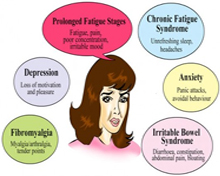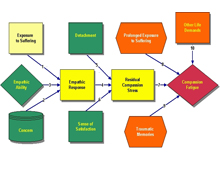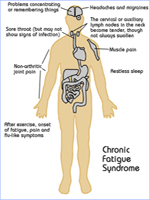Causes of Fatigue

Fatigue is a common problem among people. It is explained as a feeling of weariness, tiredness, or lack of energy. Fatigue is physical and/or mental exhaustion that can be triggered by stress, medication, overwork, or mental and physical illness or disease.
Sometimes fatigue is categorized as drowsiness but both are different. People feel drowsiness when they do not sleep well while fatigue is a lack of energy and motivation. Drowsiness and apathy can be symptoms of fatigue. Fatigue may be felt due to physical exertion, emotional stress, boredom, or lack of sleep.
it may be one of the symptoms of a more serious psychological or physical disorder. When fatigue is not relieved by enough sleep, good nutrition, or a low-stress environment, person must consult doctor to know the reason. It is very important to understand the cause of fatigue. The pattern of fatigue may help doctor to establish its fundamental cause.
Causes:
There are numerous physical and psychological causes of fatigue. Some of the common causes are an allergy that leads to hay fever or asthma, anemia (including iron deficiency anemia), depression or grief, persistent pain, sleep disorders such as ongoing insomnia, obstructive sleep apnea, or narcolepsy, under active thyroid or overactive thyroid, use of alcohol or illegal drugs like cocaine, especially with regular use. Fatigue can also accompany many diseases such as addison's disease, anorexia or other eating disorders.
 Arthritis, including juvenile rheumatoid arthritis, autoimmune diseases such as lupus
Cancer, chronic liver or kidney disease, congestive heart failure, diabetes, infection, parasitic infections, AIDS, tuberculosis, and mononucleosis, Malnutrition. It has been documented by doctors that some medicines may also cause drowsiness or fatigue, including antihistamines for allergies, blood pressure medicines, sleeping pills, steroids, and diuretics.
Arthritis, including juvenile rheumatoid arthritis, autoimmune diseases such as lupus
Cancer, chronic liver or kidney disease, congestive heart failure, diabetes, infection, parasitic infections, AIDS, tuberculosis, and mononucleosis, Malnutrition. It has been documented by doctors that some medicines may also cause drowsiness or fatigue, including antihistamines for allergies, blood pressure medicines, sleeping pills, steroids, and diuretics.
Symptoms:
Person who feels fatigue may show many symptoms that include weakness, lack of energy, tiredness, exhaustion, passing out or feeling as if you are going to pass out, palpitations (feeling your heart beating), dizziness, vertigo and shortness of breath.
Exams and Tests:
Different disorders, diseases, and lifestyle choices may result in fatigue therefore diagnosis is quite difficult. It is necessary to go for thorough examination and patient history by a qualified doctor to know the cause of the fatigue. A physician can decide if prescription drugs, poor dietary habits, work environment, or other external stressors could be triggering the tiredness.
Doctor takes a complete history of fatigue along with asking about associated symptoms to patient. The doctor may inquire about activities and symptoms to determine the probable cause of fatigue.
After knowing the exact cause, doctor conducts physical exam focusing on patient's vital signs such as weight, blood pressure, heart rate, temperature, breathing rate. To diagnose fatigue, Doctor observes at general appearance, listen to heart, lungs, and abdomen, and perform a pelvic and rectal exam. After thorough checking, doctor may prescribe following tests:
- Blood tests - It helps to diagnose whether patient is infected, anemic, or he has other problems with blood or nutrition.
Urinalysis - It gives clues that point to diabetes, liver disease, or infection - Chem-7 - Looks at 7 common substances circulating in blood. It consists of 4 electrolytes (sodium, potassium, chloride, and bicarbonate), 2 waste products of metabolism cleared by normally functioning kidneys (BUN and creatinine) and the source of energy for body's cells (glucose).
-
Thyroid function tests - Looks at function of thyroid gland, too high or too low
Pregnancy test - Sed rate - It indicates for chronic diseases or inflammatory conditions
- HIV test

Chest x-ray - Looks for infection or tumor ECG - An electrical recording that looks at the function of your heart CT scan of head - A 3-dimensional x-ray of the brain to look for strokes, tumors, or other abnormalities Diagnosis of chronic fatigue syndrome is significantly more complex. Because there is no specific biological marker or conclusive blood test to check for the disorder, doctors must depend on the patient's response and severity of symptoms to make a judgment. In many cases, individuals with chronic fatigue syndrome go through a battery of invasive diagnostic tests and several years of consultation with medical professionals before receiving a correct diagnosis.
Treatment
Usually traditional line of treatment stresses on the dietary and lifestyle changes to fight against fatigue. Individuals who experience infrequent fatigue symptoms may benefit from short term use of caffeine-containing central nervous stimulants, which make people more watchful, less drowsy, and improve coordination. However, these should be prescribed with extreme caution, as excessive use of the drug can have dangerous consequences such as serious sleep disorders-insomnia. The treatment of fatigue is decided on its fundamental cause. Normally fatigue can be lessen by prescribed treatments which include dietary and lifestyle changes, the use of essential oils and herbal therapies, deep breathing exercises, traditional Chinese medicine, and color therapy. In dietary changes, person must take balanced diet to maintain an adequate energy supply and promote overall physical well-being. Insufficient nutritional intake can boost up fatigue symptoms. Individuals who feel fatigue frequently should drink 9 to 12 glasses of water a day. Dehydration can decrease blood volume, which leads to feelings of fatigue.
Person must take iron-rich foods such as liver, raisins, spinach, apricots. Iron enables the blood to transport oxygen throughout the tissues, organs, and muscles, and diminished oxygenation of the blood can result in fatigue. It is advised to avoid high-fat meals and snacks. High fat foods take much time to digest, reducing blood flow to the brain, heart, and rest of the body while blood flow is increased to the stomach. He must eat unrefined carbohydrates and proteins together to maintain energy. Individuals should only eat when they feel hungry. Overeating can cause short-term fatigue and individuals who are overweight are much more likely to regularly experience fatigue symptoms.
Another treatment of fatigue is lifestyle changes. Numerous factors such as a high-stress job, erratic work hours, lack of social or family support, or erratic sleep patterns can trigger prolonged fatigue. If person is under stress, he can adopt many relaxation therapies and techniques to help ease tension such as massage, yoga, aromatherapy, hydrotherapy, progressive relaxation exercises, meditation, and guided imagery. Some individuals may get relief from individual or family counseling or psychotherapy sessions to work through stress-related fatigue that is a result of family or social issues.

A calm and restful sleeping environment is also important to healthy sleep. People must make their bedroom quiet and comfortable, away from loud noises and with adequate window treatments to keep sunlight and streetlights out. To motivate the nervous system and lessen fatigue Aromatherapists, hydrotherapists, and other holistic healthcare providers may advise the use of essential oils of rosemary (Rosmarinus officinalis), eucalyptus blue gum (Eucalyptus globulus), peppermint, (Mentha x piperata), or scots pine oil (Pinus sylvestris). These oils can be added to bathwater or massage oil as a topical application. Citrus oils such as lemon, orange, grapefruit, and lime have a similar effect, and can be added to a steam bath or vaporizer for inhalation.
Herbal remedies are also a good means to alleviate fatigue. These medication act as circulatory stimulants can equalize the symptoms of fatigue in some individuals. An herbalist may recommend an infusion of ginger (Zingiber officinale) root or treatment with cayenne (Capsicum annuum), balmony (Chelone glabra), damiana (Turnera diffusa), ginseng (Panax ginseng), or rosemary (Rosmarinus officinalis) to treat constant fatigue.
Caffeine-containing central nervous system stimulants such as tea (Camellia senensis) and cola (Cola nitida) can provide temporary relief of fatigue symptoms. However, long-term use of caffeine can cause restlessness, irritability, and other unwanted side effects, and in some cases may actually work to augment fatigue.
Prevention It is very important to control the causes of disease. If adequate rest and a consistent bedtime schedule are maintained then it will prove to be the most effectual ways to control fatigue. A balanced diet and moderate exercise program are also important to maintaining a consistent energy level.
Fatigue is considered to be minor problem but if it is continuously experienced by person, it can cause serious illness. People must take preventive measures at initial stage to control fatigue.
Note: This information is just for knowledge of disease. If such type of medical condition develops, consult your doctor.
Articles on Health
- Causes and remedy for dark circles in females

- Harmful impact of mobile phone on unborn baby

- Maternal health care tips

- Rheumatoid Arthritis is Most Widespread in Female
- Periodontal ailment during Pregnancy
- Anemia is prevalent in Women
- Effect of Cell phone tower radiation on human health

- Current health scenario india
- Government health policies india
- Medical facilities india
- Hospital infrastructure india
- Shortage of Medical Professionals in India
- Quality standards indian hospitals
- Indian states health statistics
- Medical expenses india
- Hospitals in Ahmedabad
- Hospitals in Bangalore
- Hospitals in Chennai
- Hospitals in Cochin
- Hospitals in Delhi
- Hospitals in Hyderabad
- Hospitals in Kolkata
- Hospitals in Mumbai
- Hospitals in Pune
- Hospitals in Coimbatore
- Hospitals in Kochi
- Orthopaedics Hospitals in India
- Diabetology Hospitals in India
- Cardiology Hospitals in India
- Infertility Hospitals in India
- Neurology Hospitals in India
- Paediatrics Hospitals in India
- Nephrology Hospitals in India
- Oncology Hospitals in India
- Antiaging foods to improve skin

- Tips for Maintaining healthy bones
- Guidelines for preventing heart disease
- Tips to reduce eye strain while working on computer
- Mental health problems among elderly people
- Health problem of piles

- Health advices for air travel

- Dealing with Allergies
- Tips for Eyes Care
- Care for Crystal Clear Skin
- Tips For Healthy Hair
- Healthy Living is The Absolute Measure of Happiness
- Let Fragrance Rule Your Summer
- Most common vestibular disorder

- Osteoporosis Risk Factors
- Dengue

- Endocrine disorder

- Causes of liver damage
- Dry eye syndrome
- Kidney Stones
- Conjunctivitis: Irritating eye disease
- Anxiety Disorder
- Causes of Brain Damage
- Hepititis B
- Knowledge of Osteoarthritis
- Mental Illness
- Back Pain
- Sugar Addiction
- Diet Control Plans
- General Motors Diet Plan
- No Carbohydrate Diet
- One day Diet Plans
- Seven day diet Plans
- Vegetarian Diet
- Food for Health
- Genetically Modified Foods
- Healing Effects Of Fruits
- Vegetables That Heal
- Healing Effects Of Spices and Herbs
- Test your Stress Level
- Mantras for Relaxation & Stress free life
- Take walk For a healthy body and mind
- Squint is frequently observed in Children
- Consult-Doctor
- Free Handy Health Advice